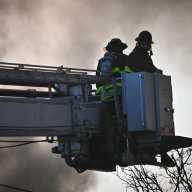Six candidates hoping to succeed outgoing Congressman Steve Israel on Capitol Hill this November took the stage at the North Shore Towers Cinema on Thursday night for a candidates’ night forum that QNS co-sponsored.
Each of the Long Island-based candidates — five Democrats and one Republican — seek to win over voters in the area of northeast Queens included in the Third Congressional District along with northern areas of Nassau and Suffolk counties.
With the June primary ballots yet to be finalized, the candidates struck a rather civil tone at Thursday night’s affair, tackling questions from the moderators on issues ranging from immigration to property taxes.
Perhaps the most familiar face to the Queens crowd was Tom Suozzi, the former Nassau County executive and one-time gubernatorial candidate. Suozzi touted himself as the candidate who can get things done, referring to his record of public service to Long Islanders and ability to work with colleagues to accomplish goals.
Three other Democrats who are currently or formerly elected officials on Long Island also participated.
Former North Hempstead Town Supervisor Jon Kaiman cited his experience in running the town and previously serving as a judge. He told residents that he would campaign for an economy that works for the people, including making proper investments in infrastructure.
Kaiman’s colleague in government, North Hempstead Councilwoman Anna Kaplan, also made economics a key point of her remarks. She said she would advocate for programs and policies that make the district and country a more affordable place to live.
Suffolk County Legislator Steve Stern cited the importance of standing up to protect the most vulnerable in society and that he would advocate for “equal pay for equal work.”
The other two debate participants have yet to hold elected office. Democrat Jonathan Charles-Clarke campaigned on a platform of boosting public integrity and civil rights, while the lone Republican to appear, finance investigator Philip Pidot, called for restoring conservative policies in Washington and reforming how government works.
Despite some differences in styles and political philosophy, all of the candidates on stage agreed to continue Congressman Israel’s ongoing efforts to reduce airplane noise over northeast Queens. They also sided with Mayor Bill de Blasio and Police Commissioner Bill Bratton in criticizing the White House for slashing homeland security funding for New York City.
Differences emerged among the candidates on hot-button issues such as taxes.
“We do not have a revenue problem; we have a spending problem,” Pidot said. He pledged to end the estate tax while working to reduce the income tax burdens that New Yorkers share.
The Democratic candidates agreed to lighten the burden in other ways. Stern supported an overall reform of the tax code and called for a middle class tax cut. Suozzi said he would take Stern’s idea of using revenue from estate taxes be redirected toward tax credits for elder care.
Kaplan said she would support a middle class tax cut, but also suggested a minimum wage increase would help improve the lives of millions of New Yorkers. Kaiman supported a tax decrease to keep up with the cost of living but also said he would work to boost the amount of federal funding coming back to New York State.
Clarke, meanwhile, refused to say outright whether he would cut taxes, but instead called for the tax cut to be reformed. He also said he would work to abolish a loophole that allow hedge fund managers to pay less taxes.
Resolving the student debt crisis was also a hot topic among the candidates. Both Clarke and Stern shared their personal experiences of grappling with post-college debt in calling for changes to the way college education is funded nationwide. Clarke seeks easier student refinancing and expanded grants, while Stern called for major banks to be taken out of the student loan business.
Kaiman turned to reduced interest rates and expanded debt forgiveness as possible solutions, while Kaplan also called for expanded Pell grants. Pidot, meanwhile, suggested the best way to resolve the crisis is through enabling greater job growth that will put college graduates to work soon after their commencement.
Regardless of the ideas exchanged, Suozzi indicated that resolving the student debt crisis and other problems gripping the nation would come down to working with colleagues in government and getting special interests out of the discussion.
An awkward moment did occur early on in the session when Clarke challenged the other candidates to publicly swear an oath not to accept campaign contributions from special interests. None of the candidates agreed to do so.
The Congressional primaries are scheduled for June 28, with the Democratic and Republican nominees facing each other in the November general election.




































